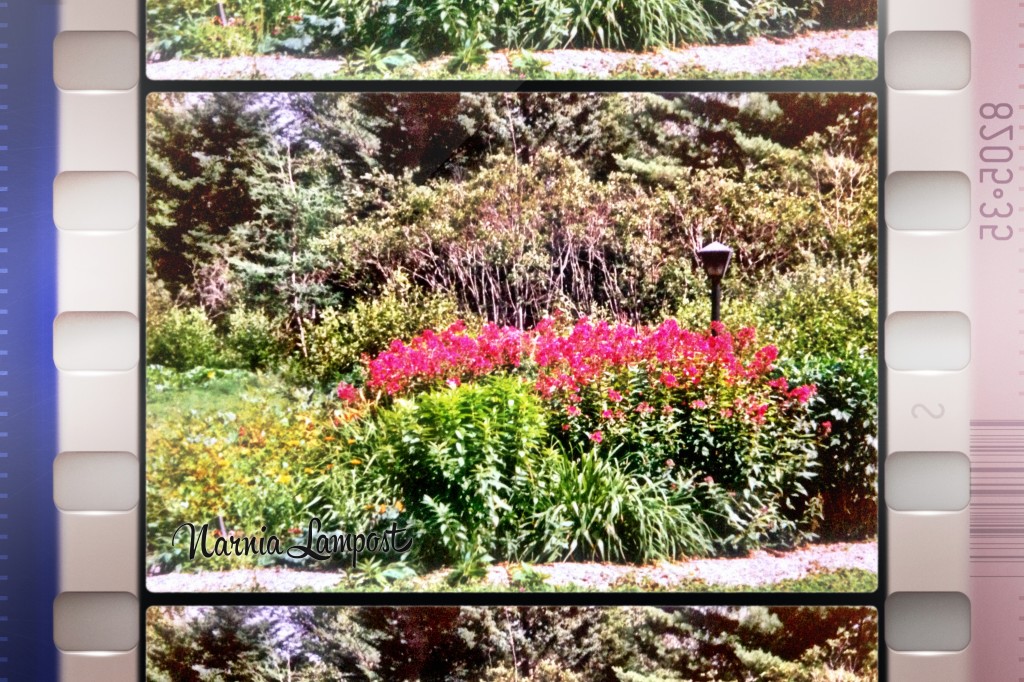When I was 29, I lived for one month at a monastery in the woods of Nova Scotia, Canada. At the time I was leaning into knowing God by personal experience, and discovering the meaning of earthy mysticism. A personal relationship with God–Christ–grew in me. (I didn’t like the word Jesus, it sounded sappy to me.) Old wounds healed, I experienced growth learning more about a loving God, in contrast to the harsh and judgmental distant God I knew as a child. The monks, both men and women, lived in what had been a hunting camp on a lake in Kemptville.
At sundown on Saturday, Sabbath began each week, and for the next 36 hours, work ceased and play and leisure erupted. I had heard the monks talk and write about The Chronicles of Narnia, and decided my solitary adventure on a Saturday night would be to go to the garden–it was enclosed and huge–curl up in the wooden swing with a wool blanket beneath the Narnia lamppost, and begin reading The Chronicles of Narnia as an adult. I rocked for hours that night in 1992, the world magical as pages turned, and stars became visible.
God had become personal and real to me, and Aslan, the great lion in the story, personified God’s presence. I appreciate all the works of C.S. Lewis, but this series, written for his goddaughter, is my favorite. In later years, my son Justin and I would read these fairy-tales by flashlight beneath his covers, later graduating to J.R.R. Tolkien’s Lord of the Rings series, then the popular Harry Potter series. I can only imagine the conversations that took place when Lewis, Tolkien, and their group, The Inklings, would meet in Oxford, England. I would have enjoyed being a bug on the wall, or a quiet observer at the table during conversations, debates, and readings from these great thinkers.
This section, from Prince Caspian (Book 4, 141-143) is one of my favorites. It spoke to me, and still does, about purifying my actions and thoughts, taking responsibility, trust, discernment, free will, leadership, spiritual growth, and a God who has “magic in his mane” and is for each of us as if we were the only person in the world to love.
“And the next thing she knew was that she was kissing him and putting her arms as far around his neck as she could and burying her face in the beautiful thick silkiness of his mane. “Aslan, Aslan. Dear Aslan,” sobbed Lucy. “At last.” The great beast rolled over on his side so that Lucy fell, half sitting and half lying between his front paws. He bent forward and just touched her nose with his tongue. His warm breath came all round her. She gazed up into the large wise face. “Welcome child,” he said. “Aslan,” said Lucy, “you’re bigger.” “That is because you are older, little one,” answered he. “Not because you are?” “I am not. But every year you grow, you will find me bigger.” For a time she was so happy that she did not want to speak.
But Aslan spoke. “Lucy,” he said, “we must not lie here for long. You have work in hand, and much time as been lost today.” “Yes, wasn’t it a shame?” said Lucy. “I saw you all right. Thy wouldn’t believe me, They’re all so–” From somewhere deep inside Aslan’s body there came the faintest suggestion of a growl. “I’m sorry,” said Lucy, who understood some of his moods. “I didn’t mean to start slanging the others. But it wasn’t my fault anyway, was it?” The Lion looked straight into her eyes. “Oh Aslan,” said Lucy. “You don’t mean it was? How could I–I couldn’t have left the others and come up to you alone, how could I? Don’t look at me like that . . . oh well, I suppose I could. Yes, and it wouldn’t have been alone, I know, not if I was with you. But what would have been the good?” Aslan said nothing. “You mean,” said Lucy rather faintly, “that it would have turned out all right–somehow? But how? Please, Aslan! Am I not to know?” “To know what would have happened, child?” said Aslan. “No. Nobody is ever told that.” “Oh dear,” said Lucy. “But anyone can find out what will happen,” said Aslan. “If you go back to the others now, and wake them up; and tell them you have seen me again; and that you must all get up at once and follow me–what will happen? There is only one way of finding out.” “So you mean that is what you want me to do?” gasped Lucy. “Yes, little one,” said Aslan. “Will the others see you too?” asked Lucy. “Certainly not at first,” said Aslan. “Later on, it depends.” “But they won’t believe me!” said Lucy. “It doesn’t matter,” said Aslan. “Oh dear, oh dear,” said Lucy. “And I was so pleased at finding you again. And I thought you’d let me stay. And I thought you’d come roaring in and frighten all the enemies away–like last time. And now everything is going to be horrid.” “It is hard for you, little one,” said Aslan. “But things never happen the same way twice. It has been hard for us all in Narnia before now.”
Lucy buried her head in his mane to hide from his face. But there must have been magic in his mane. She could feel lion-strength going into her. Quite suddenly she sat up. “I’m sorry, Aslan,” she said. “I’m ready now.” “Now you are a lioness,” said Aslan. “And now all Narnia will be renewed. But come. We have no time to lose.”
Link: C.S. Lewis
- What is a favorite story that evokes wonder or truth for you?
Inked is my forty day journey of significant authors and books from my spiritual lifeline. Lent, 2014.





